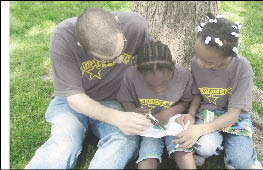 |
|
Youth learn together from the Citizenship Workbook. Photo: Kid Power |
Calvary Baptist Church
Washington, D.C.
(202) 383-4543
http://www.kidpowerdc.org
Objective: Empower youth to become informed and engaged advocates for change in their lives and in their communities.
In a Nutshell: Kid Power is a civics-based organization that provides academic, artistic and service-learning opportunities for youth in underserved neighborhoods. The main program pairs local public and private school students who work together to complete a Citizenship Workbook and plan and carry out an artistic and/or service-learning project. In an entrepreneurial program, youths work with a local bakery to produce cookies that are sold to raise funds for service trips and projects.
Where it Happens: At 11 public elementary and middle schools in Washington, D.C., plus service-learning programs at three private schools.
When it Began: Founded in 2002, the group initiated direct-service educational programs in October 2003.
Who Started it and Who Runs It: Inspired by their work with youth in low-income Washington neighborhoods, educators Max Skolnik and Caroline Sholl set out to develop a youth-centered organization that explores the history and civic pride of the city. In addition to Skolnik as executive director and Sholl as program director, Kid Power employs five full-time staffers, two full-time elementary and middle school directors, a part-time operations director, and 19 part-time program site coordinators. Kid Power also benefits from the work of approximately 250 high school-age and young professional volunteers.
Overcoming Obstacles: A fundraising plan that included writing a grant, a wide array of corporate and individual donors, and aggressive special-event and earned-income strategies helped overcome funding limitations. Institutionalized mentor/tutor partnerships with well-established private schools helped to meet critical volunteer, material, facility and financial needs and provided educational resources that helped raise the academic standards of Kid Power’s Citizenship Workbook.
To combat staff retention and training problems, Kid Power offers numerous training opportunities to its staff, including enrollment in the Academy for Educational Development’s Advancing Youth Development program.
Cost: The current budget is $475,000.
Who Pays: Top funders include DC Children & Youth Investment Trust Corp., CakeLove Bakery and the Commonweal Foundation. Others include the Jacob and Charlotte Lehrman Foundation, Walmart Foundation, the Morris & Gwendolyn Cafritz Foundation, The Washington Post Co., the Combined Federal Campaign and United Way.
Youth Served: 250 at-risk public school students, ages 8 to 13. Fifty-five percent of the youths are girls; 62 percent are African-American, 32 percent Latino, 3 percent Asian and 3 percent of other backgrounds. Nearly all students qualify for the free or reduced lunch. About 170 private school youths also participate.
Youth Turn-On: Working with mentors to complete hands-on learning and service projects; taking field trips and getting the opportunity to influence their communities.
Youth Turn-Off: Some grumble about working on an additional, hour-long academic curriculum with their tutors – after a full day at school, an hour of homework help and a 40-minute bus ride.
Research Shows: In a 2007 reading pre-assessment, students scored one year behind grade level. In the post-test conducted in June 2008, students had improved an average of 1.3 grade levels and ended the year only three months behind their on-level peers. During the 2007-08 school year, students improved from a score of 56.7 percent to 75.6 percent on Kid Power’s civic knowledge and behavior assessment. In social behavior assessments during the same time period, students improved from a 70.1 percent “good behavior” score to 80.7 percent.































